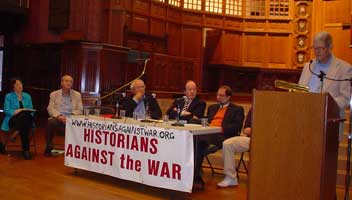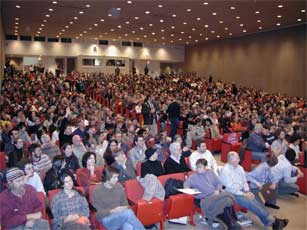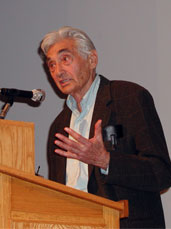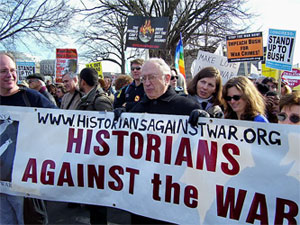H-PAD, under its original name of Historians Against the War, was formed in January 2003 at the American Historical Association (AHA) convention in Chicago, January 2-5, with Van Gosse and Andor Skotnes as the initial co-chairs. Its purpose was to resist the George W. Bush administration’s drumroll for invading Iraq. The following petition was generated:
We historians call for a halt to the march towards war against Iraq. We are deeply concerned about the needless destruction of human life, the undermining of constitutional government in the U.S., the egregious curtailment of civil liberties and human rights at home and abroad, and the obstruction of world peace for the indefinite future.
Following the AHA, where 667 historians signed, the petition was widely circulated and drew more than 2,100 signatures by the time of the actual invasion two months later.
Members met in New York City on May 31, 2003, in the wake of the invasion, and decided to extend HAW’s existence, with a focus on ending the Iraq War and on defending civil liberties in the US. In the wake of the New York meeting, a new petition was announced on September 21, worded as follows:
As historians, teachers, and scholars, we oppose the expansion of United States empire and the doctrine of pre-emptive war that have led to the occupation of Iraq. We deplore the secrecy, deception, and distortion of history involved in the administration’s conduct of a war that violates international law, intensifies attacks on civil liberties, and reaches toward domination of the Middle East and its resources. Believing that both the Iraqi people and the American people have the right to determine their own political and economic futures (with appropriate outside assistance), we call for the restoration of cherished freedoms in the United States and for an end to the U.S. occupation of Iraq.

More than 2,600 people signed the petition over the next several years, which became the defining statement for HAW. HAW considered everyone who signed a member.
From the start, HAW saw itself as part of a broader movement. It played an active role in the broad national antiwar coalition United for Peace and Justice (UFPJ), formed in October 2002. When millions around the world marched on February 15, 2003, to protest the Bush administration’s plans for an invasion, a HAW contingent took part in the New York City march, with a wide banner.
Besides circulating the petition, the autumn of 2003 through the spring of 2005 HAW:
- Created a website (historiansagainstwar.org) including “teaching resources”;
- Set up a loosely coordinated speaker’s bureau with HAW members volunteering to speak on areas of their expertise. (Since users contacted speakers directly rather than though HAW, we don’t know how extensively the list was used.)
- Held a forum at the January 2004 AHA convention in Washington, with Staughton Lynd, Rusti Eisenberg, and Irene Gendzier as the speakers;
- Held a “Town Hall” forum in New York during the August 2004 Republican National Convention, with speakers Andrew Bacevich, Ellen Schrecker, Renate Bridenthal, and Tom Bender debating the extent to which the Bush administration had “broken with the mainstream American past”;
- Published several pamphlets, including one that followed the Abu Ghraib revelations in Iraq, called Torture American Style, published on newsprint in the fall of 2004, edited by Margaret Power, and distributed with the help of other United for Peace and Justice member groups
GREATER NATIONAL PRESENCE, 2005-2008
At some point during 2005, planning began for HAW’s first national conference. At the same time, HAW began taking a more active role in the AHA. Highlights of this period included the following:
- The AHA business passed a HAW resolution on academic freedom during the January 2006 AHA convention in Philadelphia. The resolution opposed model legislation proposed by David Horowitz then being introduced in various states.
- HAW’s first national conference, with the theme “Empire, Resistance, and the War in Iraq,” took place at the University of Texas, Austin, February 17-19, 2006, hosted by Robert Jensen of the UT journalism school. About 250 people took part in the conference, and more than a thousand additional persons attended the Friday evening keynote session featuring Howard Zinn.


- HAW made a major effort to encourage campus teach-ins during the fall semester of 2006. HAW’s work on the teach-ins included lining up a list of several dozen knowledgeable speakers who were willing to waive honoraria. More than 40 events were held at different campuses.
- HAW submitted a resolution calling for an end to the Iraq War at the January 2007 AHA convention in Atlanta. The business meeting passed it handily and then the AHA Executive Council submitted it to the membership for a vote. When the vote was announced in mid-March, the resolution had passed by a margin of 3 to 1. This was the first time the AHA had taken a stand in opposing a current US war.

- HAW had a contingent in a January 2007 march and rally against the Iraq War in January 2007, aimed at putting pressure on Congress, newly controlled by Democrats, who had made the war an issue in the November 2006 elections
- HAW’s second national conference took place at Georgia State University in Atlanta in April 2008, with Georgia State historian/activist Ian Fletcher as the local organizer. The theme was “War and Its Discontents: Understanding Iraq and the U.S. Empire.” It was co-sponsored by the Peace History Society, though HAW was the main sponsor. About 150 people came for the conference, plus another 200 or so for the Friday evening plenary (with Naomi Klein and Bill Fletcher, Jr. as the speakers). Presenters included people from 46 different colleges and universities.
HAW IN THE OBAMA ERA
In the late fall of 2008 the Steering Committee broadened HAW’s primarily Iraq focus by passing two resolutions, one calling for US withdrawal from Afghanistan and one condemning US support for the Israeli invasion of Gaza. These resolutions came during the winding-down of the George W. Bush administration, climaxed with the election of Barack Obama as president in November 2008. In the January 2009 AHA convention in New York, HAW sponsored a very well-attended forum “The Bush-Cheney Legacy” as the theme. Alice Kessler-Harris, David Montgomery, Vijay Prashad, Ellen Schrecker, and Barbara Weinstein analyzed a range of Bush administration policies.
The Steering Committee adopted a much longer and broader mission statement to replace the September 2003 version in March-April 2009. The new statement was submitted to a ratification vote in which everyone on the HAW email list was eligible to vote. The vote was 196 in favor and 14 opposed, so the new statement was adopted. Its first four paragraphs focused on foreign policy, but its concluding paragraph foretold an expansion of HAW’s interests:
We are aware that, in the words of the late historian William Appleman Williams, “empire as a way of life” has long characterized the United States and is not easily changed. However, we are mindful as well that the current conjunction of international and domestic crises offers an opportunity to alter longstanding destructive patterns. As historians, we believe that we can and must make a contribution to the broad, international movements for peace, democracy, and environmental and social justice. In pursuing our objectives, we look toward building and joining alliances with a wide variety of intellectual and activist groups that share our concerns.
The new statement also raised the issue of what would constitute membership in HAW. The policy adopted was that membership would be based on “substantial agreement” with the new statement and on an expressed desire to be a member. All those who voted Yes in the ratification vote were automatically enrolled as members. (The practical difference between membership and simply being on the email list was that only members would be eligible to vote for candidates for the Steering Committee)
In the three years after the adoption of the new mission statement, not much happened. i.e., just as HAW’s scope became broader, we did less, at least by way of coordinated activities. Following are some notes on this period.
- HAW Notes – Starting in 2009, we sent messages to our email list that contained occasional announcements plus “Links to recent articles of interest.”
- Our other main means of communication with our email list was when Rusti Eisenberg sent periodic updates about Congressional legislation bearing on issues of war and peace.
- After Howard Zinn died in January 2010, HAW and the Labor and Working Class History Association co-sponsored a session at the April convention of the Organization of American Historians in Washington, DC, with Staughton Lynd as the main speaker.
- The conference was able to tap into the Baltimore activist community and also draw in a number of national antiwar organizations with headquarters in Washington, DC nearby. A successful fundraising appeal to the HAW email list brought in several thousand dollars in donations before the conference, enabling us to make the conference free to residents of “the greater Baltimore area.” It was a feel-good conference, with professors, graduate students, and a great variety of non-campus activists mingling cooperatively.
The Baltimore conference was the last national conference planned by HAW, and no major initiatives came out of the conference or the summer 2013 Steering Committee meeting that followed. Although HAW Notes e-mailings and alerts from Rusti Eisenberg continued, most organizing-type activity during 2014-16 concerned Palestine/Israel rather than US wars. Highlights included:
- After inviting input from people on the HAW email list, the Steering Committee voted in the spring of 2014 to endorse the BDS (boycotts, divestment, sanctions) movement; a working group was set up, including some SC members and some non-members.
- In the summer of 2014, HAW members initiated a historians’ letter to President Obama and Congress criticizing Israel’s assault on Gaza. Around 1,500 scholars, in the US and elsewhere, signed the petition, which urged the suspension of US military aid to Israel “until there is assurance that this aid will no longer be used for the commission of war crimes.” It concluded, “As historians, we recognize this as a moment of acute moral crisis in which it is vitally important that United States policy towards the Israeli-Palestinian conflict change direction.”
- We organized two events at the January 2015 AHA convention in New York: (1) a roundtable entitled “What Is the Responsibility of Historians Regarding the Israel/Palestine Conflict?” with speakers Joel Beinin, Leena Dallasheh, Linda Gordon, and Barbara Weinstein; (2) two resolutions were circulated calling on the AHA to speak out on Israeli violations of Palestinian academic freedom. The roundtable went well, the resolutions less so. Because they were submitted after the agenda deadline for the AHA’s annual business meeting, the resolution could only have been added to the agenda by a special vote. By a vote of 144 to 51, the business meeting decided not to consider the resolutions.
- In the fall of 2015, HAW gathered signatures for another resolution on academic freedom for Palestinians. It was defeated by 111-51 at the AHA business meeting during the 2016 convention in Atlanta.
RENOVATION AND A NEW NAME, 2017–
In the new political atmosphere following the November 2016 elections, the HAW Steering Committee met in January in New York City. Most attendees expressed support for a much-broadened focus for HAW and a new statement setting forth an intent to resist the incoming Trump administration on many fronts.
Following the meeting, there was much discussion within the SC of a draft statement, to be sent to the HAW-Info list for feedback and then potentially adopted as HAW policy. The following statement emerged from this process and was adopted:
Historians Against the War was formed in January 2003 to oppose the Bush Administration’s drive for a pre-emptive, illegal invasion of Iraq. We participated actively in the antiwar movement of the Bush years, and we continued to challenge U.S. foreign policy and extended support for Palestinian human rights in the Obama era. Now, with the ascent of an extreme rightwing administration contemptuous of constitutional norms, we have a new mission: to stand up for peace and diplomacy internationally, and democracy and human rights at home. Our work, as historians against war and for peace and democracy, will have two focuses. First, we see our campuses as key sites for both repression and resistance. We will fight for the right to education, free speech and academic freedom for all members of campus communities, and for the human and civil rights of our students, especially the undocumented, Muslims, people of color, women and LGBTQ people. Second, we will join the organized resistance to Donald Trump’s regime by mobilizing historians, teachers, and historically-minded activists to challenge the permanent campaign of “fake news” and phony history that has driven the right’s ascent. We will defend the discipline of history against attempts to reduce it to simple affirmations of “American greatness,” and document how prior eras of reaction and repression were successfully combatted. We recognize that the Trump/Pence Administration is a threat not only to the people of the United States, but to the people of the world, and we will stand against a new nuclear arms race, more imperial interventions, and collaboration with authoritarian regimes in the Middle East, Europe, and Asia.
The first Steering Committee election since 2012 was held in late April/early May of 2017, following adoption of the new name and mission statement. Everyone on the HAW email list was eligible to vote. Twenty people were elected, close to half of them new. The newly constituted Steering Committee elected Margaret Power and Van Gosse as co-chairs.
Under its new name, H-PAD has paid renewed attention to AHA conventions. At both the 2018 and 2019 conventions (in Washington and Chicago, respectively), H-PAD sponsored panels and also convened meetings of members and non-members to discuss strategy. The same format was used, with much higher attendance, at the AHA meetings in 2020 (shortly before the onset of the Covid-19 pandemic) and 2023 (in the return to near-normal that accompanied the pandemic’s easing). Andor Skotnes has been the main coordinator of all these mini-conferences.
H-PAD took the initiative in convening a National Strategy Meeting of Historians at Columbia University on May 28, 2019. Forty-seven activist historians attended, most of whom had not previously been active in HAW/H-PAD. Well over a hundred others expressed interest but were not able to attend because of other commitments. At the meeting, several working groups were formed. In a closing plenary, participants voted not to form a new network but to work to integrate the new activists, working groups, and ideas from the meeting into a renovated H-PAD.
In 2022-23, H-PAD’s major focus has been on countering the right-wing “culture wars” that, in part, seek to tame and control the teaching of history at all levels. H-PAD joined in the effort of the African American Policy Forum to encourage faculty senates to pass resolutions defending academic freedom against the emerging threats. More recently, H-PAD has created, and maintains, a “Culture Wars Archive” elsewhere in this website, and has joined with other groups to form Historians on Call, consisting of historians in each state willing to join in support of teachers who are under attack for portraying US history with a less-than-rosy perspective.
